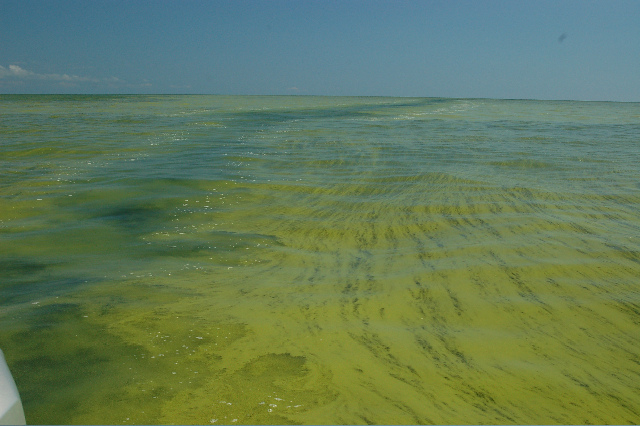Who do you trust with your drinking water? The free market, or government?
Garrett Hardin wrote “The Tragedy of the Commons” in 1968, but he could have been writing about the contamination of drinking water for a half-million people around Toledo this month. Rational people have acted in a self-interested way that harms the community as a whole. Excess phosphorus, mainly from farming practices, is stimulating algal blooms that are a toxic contaminant to human drinking water.
Lake Erie has been through this before. In the 1970s it was being choked by algal blooms, but better treatment of sewage and regulation of phosphates in detergents brought it back to better health.
In case you missed the obvious point: The free market didn’t bring you those solutions. Those were government actions. We had reached the point where we had to act collectively for the sake of any sane notion of a future.
So, how do you feel about that? Do you miss your phosphate-rich Tide of the 1970s on laundry day? Does your sense of freedom feel suffocated?
I ask because five years ago Erick Erickson of Red State blog wrote about regulation of phosphate detergents in the state of Washington this way: “At what point do the people tell the politicians to go to hell? At what point do they get off the couch, march down to their state legislator’s house, pull him outside, and beat him to a bloody pulp for being an idiot?”
Granted that Erickson seems to be more pugilist than thinker, but I surmise the absolutist mentality he espouses is one of the reasons we have so much trouble addressing conflicts in the commons.
Management of sewage and storm runoff are certainly ancillary problems in Lake Erie’s 2014 algal blooms, but science is pointing at agriculture as the principal problem today. Runoff of phosphorous fertilizer and livestock waste applied to frozen or snow-covered fields are the sources feeding algal blooms that are a threat to the life of Lake Erie and its surrounding residents.
The agriculture industry attempted to get out front of the problems by saying that farmers could implement voluntary corrections. But as Lana Pollack of the International Joint Commission wrote in the Detroit Free Press, “Many well-meaning programs to reduce farmland pollution are voluntary. That leaves responsible farmers to foot the bill for doing their share of pollution avoidance, and leaves bad actors free to spread phosphorous-rich fertilizer and animal waste during cold-weather months when much of it sloughs into public waters with spring thaws and downpours.”
That means that responsible farmers will do the right thing, and irresponsible farmers should be compelled to do so. That is the way it has to be. That is not government overreach. That is the responsibility of government.
The fact is that we humans are too numerous, too industrious and far too consumptive of energy and materials to just buy and sell in a marketplace and let the chips fall where they will. We are capable of industrial-scale damage to the home we share and no free rider should have the right to extract wealth while ignoring the cost of damage done to us all. Otherwise, you can look forward to a very unhealthy future for the great many of us.
Tragedies of the commons such as Toledo’s drinking water and the chemical alteration of our atmosphere and oceans are among the greatest challenges of civilization in our time. We have to be able to manage human impacts on the environment intra-nationally and internationally, or decreasing numbers will have a life worth living. Because China now emits more carbon dioxide than America doesn’t mean we should just continue to pursue a dead-end energy policy. Because yields and profits can be driven higher by environmentally irresponsible farm practices doesn’t mean we should allow it.
Your right to pollute ends at the collective right to drinkable water.
And that brings us to politics: how we do, or do not, get things done in the public interest. Freedom absolutists brandish Ayn Rand’s big books of fairy tales like so many Red Guards with their little red books during the Cultural Revolution. The ideological fervor is like a religion. The anger is consuming. The results are a stagnant economy for all but the wealthiest few.
The unfettered market is not the answer to all of civilization’s problems, despite what the loudest political bullhorn has to say. Politics that are bent on destroying the government just might succeed. Who protects the commons then?
See what new members are saying about why they donated to Bridge Michigan:
- “In order for this information to be accurate and unbiased it must be underwritten by its readers, not by special interests.” - Larry S.
- “Not many other media sources report on the topics Bridge does.” - Susan B.
- “Your journalism is outstanding and rare these days.” - Mark S.
If you want to ensure the future of nonpartisan, nonprofit Michigan journalism, please become a member today. You, too, will be asked why you donated and maybe we'll feature your quote next time!


 What’s in your water? The algae blooms that contaminated the municipal water supply for 500,000 people represent a tragedy of the commons. (Photo by Ohio Department of Natural Resources; used under Creative Commons license)
What’s in your water? The algae blooms that contaminated the municipal water supply for 500,000 people represent a tragedy of the commons. (Photo by Ohio Department of Natural Resources; used under Creative Commons license)